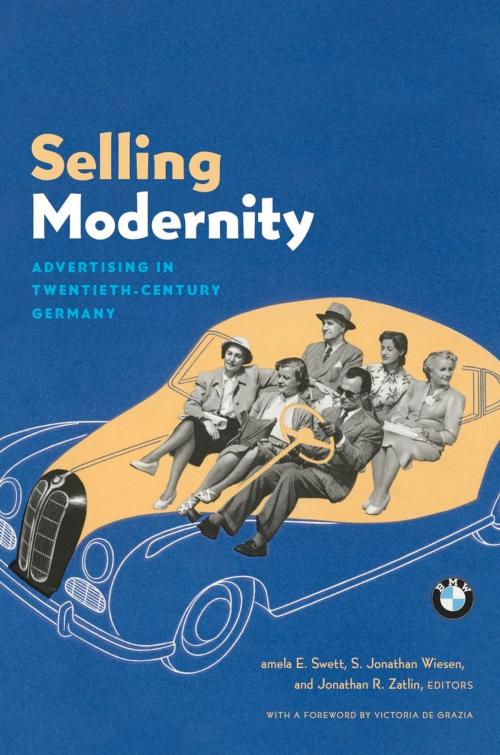| Author: | Victoria De Grazia | ISBN: | 9780822390350 |
| Publisher: | Duke University Press | Publication: | August 29, 2007 |
| Imprint: | Duke University Press Books | Language: | English |
| Author: | Victoria De Grazia |
| ISBN: | 9780822390350 |
| Publisher: | Duke University Press |
| Publication: | August 29, 2007 |
| Imprint: | Duke University Press Books |
| Language: | English |
The sheer intensity and violence of Germany’s twentieth century—through the end of an empire, two world wars, two democracies, and two dictatorships—provide a unique opportunity to assess the power and endurance of commercial imagery in the most extreme circumstances. Selling Modernity places advertising and advertisements in this tumultuous historical setting, exploring such themes as the relationship between advertising and propaganda in Nazi Germany, the influence of the United States on German advertising, the use of advertising to promote mass consumption in West Germany, and the ideological uses and eventual prohibition of advertising in East Germany.
While the essays are informed by the burgeoning literature on consumer society, Selling Modernity focuses on the actors who had the greatest stake in successful merchandising: company managers, advertising executives, copywriters, graphic artists, market researchers, and salespeople, all of whom helped shape the depiction of a company’s products, reputation, and visions of modern life. The contributors consider topics ranging from critiques of capitalism triggered by the growth of advertising in the 1890s to the racial politics of Coca-Cola’s marketing strategies during the Nazi era, and from the post-1945 career of an erotica entrepreneur to a federal anti-drug campaign in West Germany. Whether analyzing the growing fascination with racialized discourse reflected in early-twentieth-century professional advertising journals or the postwar efforts of Lufthansa to lure holiday and business travelers back to a country associated with mass murder, the contributors reveal advertising’s central role in debates about German culture, business, politics, and society.
Contributors. Shelley Baranowski, Greg Castillo, Victoria de Grazia, Guillaume de Syon, Holm Friebe, Rainer Gries, Elizabeth Heineman, Michael Imort, Anne Kaminsky, Kevin Repp , Corey Ross, Jeff Schutts, Robert P. Stephens, Pamela E. Swett, S. Jonathan Wiesen, Jonathan R. Zatlin
The sheer intensity and violence of Germany’s twentieth century—through the end of an empire, two world wars, two democracies, and two dictatorships—provide a unique opportunity to assess the power and endurance of commercial imagery in the most extreme circumstances. Selling Modernity places advertising and advertisements in this tumultuous historical setting, exploring such themes as the relationship between advertising and propaganda in Nazi Germany, the influence of the United States on German advertising, the use of advertising to promote mass consumption in West Germany, and the ideological uses and eventual prohibition of advertising in East Germany.
While the essays are informed by the burgeoning literature on consumer society, Selling Modernity focuses on the actors who had the greatest stake in successful merchandising: company managers, advertising executives, copywriters, graphic artists, market researchers, and salespeople, all of whom helped shape the depiction of a company’s products, reputation, and visions of modern life. The contributors consider topics ranging from critiques of capitalism triggered by the growth of advertising in the 1890s to the racial politics of Coca-Cola’s marketing strategies during the Nazi era, and from the post-1945 career of an erotica entrepreneur to a federal anti-drug campaign in West Germany. Whether analyzing the growing fascination with racialized discourse reflected in early-twentieth-century professional advertising journals or the postwar efforts of Lufthansa to lure holiday and business travelers back to a country associated with mass murder, the contributors reveal advertising’s central role in debates about German culture, business, politics, and society.
Contributors. Shelley Baranowski, Greg Castillo, Victoria de Grazia, Guillaume de Syon, Holm Friebe, Rainer Gries, Elizabeth Heineman, Michael Imort, Anne Kaminsky, Kevin Repp , Corey Ross, Jeff Schutts, Robert P. Stephens, Pamela E. Swett, S. Jonathan Wiesen, Jonathan R. Zatlin















